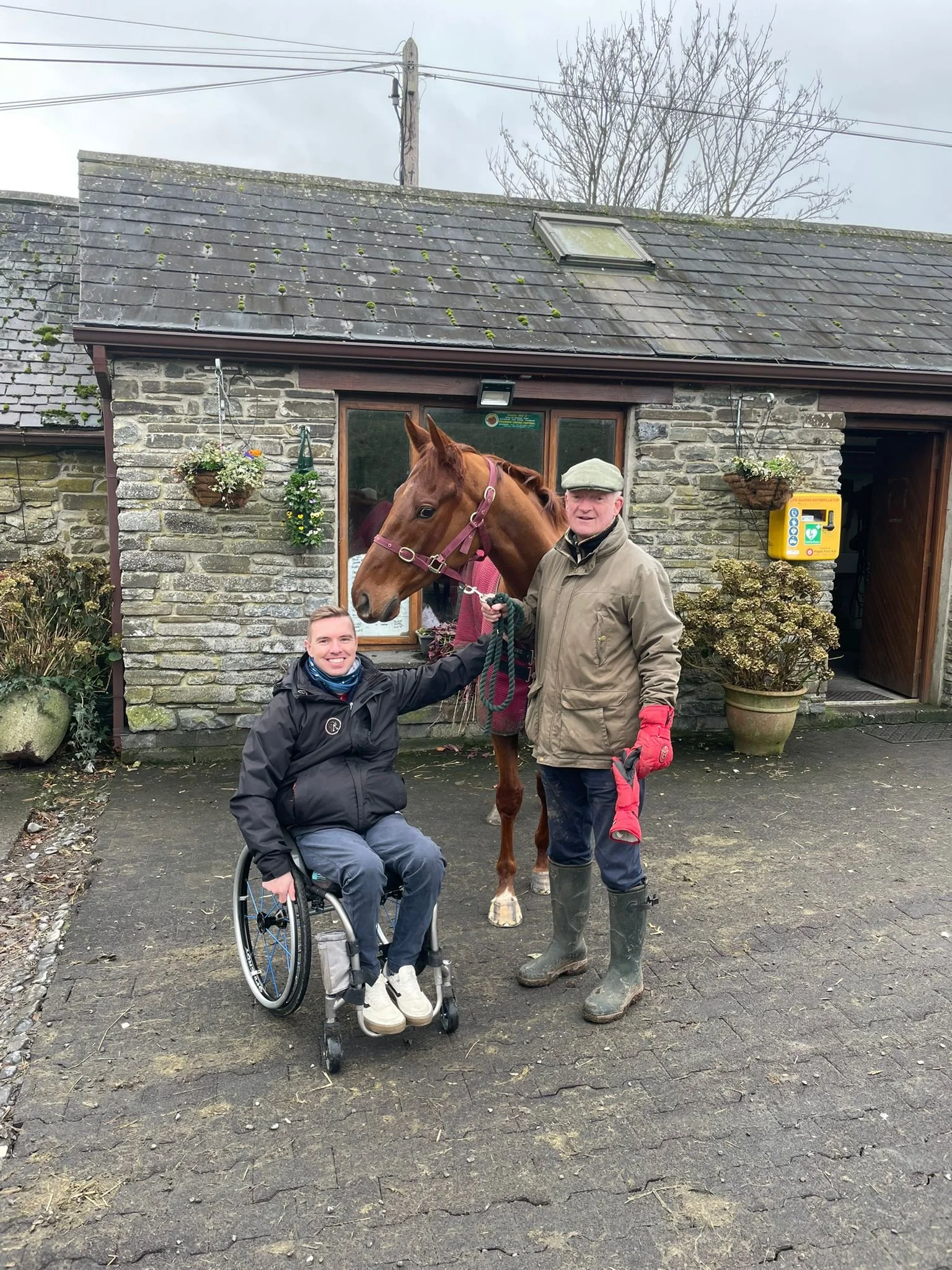French Racing: Former Jump Jockey Jacob Pritchard Webb Shares His Insights
Is French Horse Racing the Future? We Chat to Ex-Jockey Jacob Pritchard Webb
Why is French racing so popular? Former professional jump jockey Jacob Webb discusses his big move to France, taking a look at French racecourses, jockeys, prize money and more.
I never knew that a two-month working holiday to France in 2018 would end up in a move there a year later to embark on a career as a professional jump jockey.
But once I got there, I knew I had to move - and there were opportunities available wherever I looked.
It was a career on the up that involved me learning French and travelling the country riding horses around big green fields... what could be better?
However, that all ended on June 23rd 2020 in a race at France's premier jump track in Paris, Auteuil, where I unfortunately had a fall that left me paralyzed from the chest down.
Now, some might think that would leave me sour and full of hatred for horses and the sport of racing, especially in France.
But you couldn’t be more wrong. In fact, my passion for racing is now purely with the French. The horse didn’t make me fall on purpose, and no one caused it - it was just very very bad luck.
So why French racing, you wonder?
Well, before my untimely end, I did have some success, which always helps bring back good memories when watching French racing.
However, there are so many good things about French racing, so much so that I even decided to embark on becoming an owner myself out there.
Let’s take a look at the dominance of French horse racing - including France’s vast racecourses, racing culture and opportunities for jockeys out there.
Racecourses in France
France has 205 racecourses dotted across the country so it doesn’t matter where you are, there will be a racecourse near you.
Some of these racecourses might only be open for two days a year, normally around a bank holiday - but these could be the best two days of racing you’ll have all year!
The entry fee is next to nothing and the food and drink are all locally sourced. You’re not only helping the locals but mostly likely drinking with them too, as these days become real community events for the local town or village.
Pau and Cagnes Sur Mer
Away from the countryside and into the towns and cities, racetracks open and close at different times of the year.
Take jump racing for example. From December to February, jump racing only takes place at two racecourses, Pau and Cagnes Sur Mer.
Both of these sporting venues are in the south of France but at either end of the country. All the trainers move a team of horses and staff down to live and train the horses there.
Both racecourses have attributes, such as being near the sea or the mountains, but each course offers viewers a different spectacle, with highly competitive racing.
Jacob with Felix De Giles
Spending two months in Pau myself, I loved the city and the racecourse. In particular, I loved watching cross-country races, one of the hardest and most technical to ride across France.
It’s both frightening and exciting to ride cross-country, with the horses being complete specialists in this division.
Once the 24 meetings at Pau and 15 at Cagnes are over, everyone moves back up north to their own establishments, ready for the major racecourses to open in Paris, such as Auteuil, Compeigne and Fontainebleau.
Auteuil: Frances’s Answer to Cheltenham
Auteuil is France’s equivalent to Cheltenham Racecourse. It’s the premier jump track, with all nine grade ones held there, compared to the UK, where there are 40 grade ones and 14 grade ones at Cheltenham alone.
The racecourse opens in March and closes in the middle of June to shut for the summer, before opening up again in September to December.
The cream of the crop runs at Auteuil, with trainers bringing their best three-year-olds to debut there. They most likely end up selling to the UK or Ireland for at least a quarter of a million euros.
Bonkers I know - but that’s what a performance at Auteuil can do. Greats such as Kauto Star, Long Run, Neptune Collanges and Douvan have all cut their teeth running around the iconic race track under the shadow of the Eiffel Tower, before being sold on to conquer Cheltenham and Aintree.
Racecourses in Western France
Alongside the premier tracks in Paris, there’s also a plethora of racetracks throughout the west of France that offer viewers something a bit different.
Along with the multitude of races that go on in the west, cross-country races are a very popular discipline in France, with a big following in the west.
Similar to the cross country that happens during the three-day eventing, these horses must jump up and over banks and run through water (on one track, they use an actual river).
At Le Lion d’Angers, a small town near Angers, their cross country involves going up and down what they call steps. This involves three sharp descents one after the other during the 7.2-kilometre race, the longest in the world.
Jacob on the farm with his horses
French Horse Racing’s Popularity in the UK and Ireland
There are a number of reasons why French racing is discussed more and more in the UK and Ireland.
There’s a huge number of horses being bought out of French racecourses to race in the UK - and quite frankly dominating British racecourses - but that’s an article for another time.
The UK and Irish bloodstock agents (people who buy racehorses for people) and pin-hookers (people who buy an unraced yearling or two-year-old and sell them as an unraced three-year-old, for example) are even travelling across France in search of horses at studs and in fields.
They’ll pay a pretty price to the breeder before it can enter a sale and be on the market, such is the demand for the French progeny.
With French horse racing getting a spot on Sky Sports racing, we’re seeing the spectacle that each racecourse and jump can offer.
In France, they don’t jump a plain fence like they do in the UK, where they all look the same. Instead, they jump a variety of different ones. In my opinion, this makes each race a greater test for both horse and jockey.
Jacob and Master trainer Willie Mullins
Prize Money
As well as the spectacle of French horse racing, we’re also seeing the prize money to be won in France.
The French Gold Cup at Paris, known as the Grand Steeple Chase de Paris, gives nearly 100k more to the winner than the Cheltenham Gold Cup... their flagship race.
Only the Grand National first prize is more. This is just one example - and it’s at the top end.
However, at the lower end, owners have a greater chance of their horse paying for itself and covering its training fee. This is why a growing number of UK and Irish-based people are racing horses in France.
A client of mine bought two horses for a total of 22k from a UK sale - and after collectively running 10 times in France they won 87k, winning only once each.
In comparison to their ability, they wouldn’t have had the opportunity to run in such races or win that sort of money in the UK.
Jockeys in France
It’s not just the owners, but the jockeys, that I believe are better off in France too…
Take Felix de Giles and James Reveley, for example. They were both just making a living in the UK as journeymen jockeys, riding every day and not struggling, but not flourishing either - and this is after they’d both ridden over 250 winners.
Ten years ago, they decided to move to France for more opportunities and a better lifestyle - and they haven’t looked back.
James has ridden three gold cup winners and been champion jockey three times, only riding more than 100 winners in a season once.
To put that in perspective, great Irish jockey AP McCoy easily rode over double that during most seasons on his path to becoming a champion jockey.
It’s not only the number of wins that differs, but the prize money, too. Last year, Felix was a champion jockey for the very first time, winning 92 races and 3.8 million euros in total prize money.
Compare that to Sean Bowen, who is currently leading the race to be champion. After 121 wins with four months left until the end of the championship, he has won 1.1 million in prize money.
So over a shorter period of time, and having already ridden in more races than Felix with four more gruelling months of national hunt racing left, he’s only earned a third of what Felix has so far…
Why more lads don’t go over to France I’ll never know - but that’s also an article for another time.
An Insight into French Horse Racing
French racing has a special place in my heart. It gave me the chance to be a jockey and now I’m a bloodstock agent and owner, too.
For me, horse racing is a true test of horse and rider - and I see that displayed nowhere better than in France!
Read more on our horse racing blog: interviews, stories, profiles and more!




